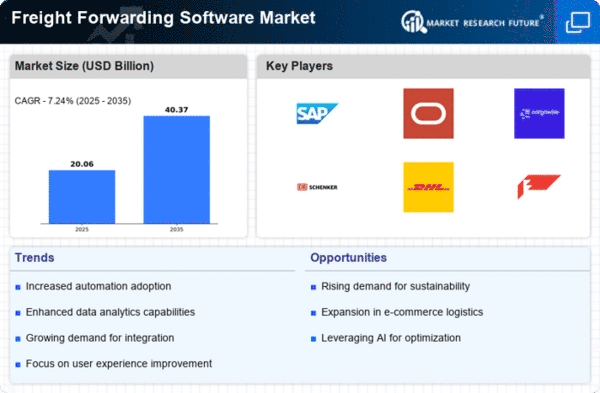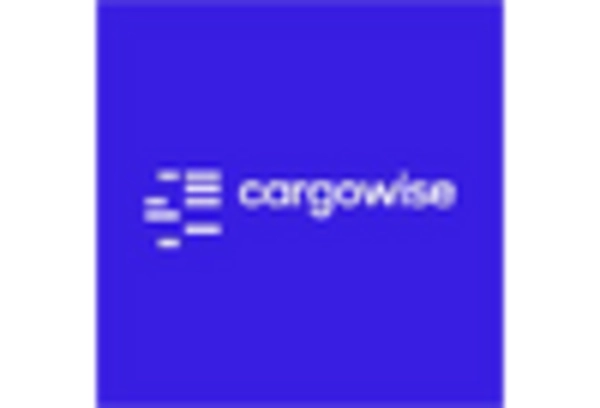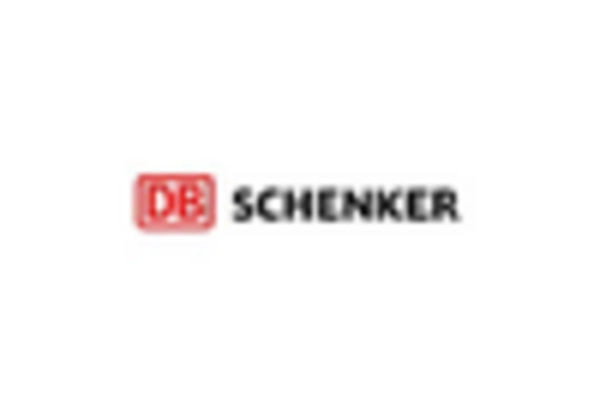North America : Market Leader in Freight Solutions
North America continues to lead the Freight Forwarding Software Market, holding a significant market share of 9.0 in 2024. The region's growth is driven by increasing e-commerce activities, demand for real-time tracking, and regulatory support for digital transformation in logistics. The adoption of advanced technologies like AI and IoT is also enhancing operational efficiency, making freight forwarding more streamlined and responsive to market needs. The competitive landscape is robust, with key players such as SAP, Oracle, and DHL dominating the market. The U.S. stands out as a major contributor, supported by a strong infrastructure and a high demand for logistics services. Companies are increasingly investing in innovative solutions to meet customer expectations, ensuring that North America remains at the forefront of the freight forwarding software industry.
Europe : Emerging Hub for Innovation
Europe's Freight Forwarding Software Market is poised for growth, with a market size of 5.5 in 2024. The region benefits from a strong regulatory framework that encourages digitalization and sustainability in logistics. Increasing cross-border trade and the need for efficient supply chain management are key drivers of demand. The European Union's initiatives to enhance transport infrastructure further support market expansion, making it a vital area for investment in freight solutions. Leading countries like Germany, France, and the UK are at the forefront of this market, hosting major players such as Kuehne + Nagel and DB Schenker. The competitive landscape is characterized by a mix of established firms and innovative startups, all vying for market share. The focus on sustainability and compliance with EU regulations is shaping the development of new software solutions, ensuring that Europe remains a dynamic player in the freight forwarding sector.
Asia-Pacific : Rapidly Growing Market Potential
The Asia-Pacific region is witnessing significant growth in the Freight Forwarding Software Market, with a market size of 3.5 in 2024. This growth is fueled by rising trade volumes, increasing demand for logistics services, and government initiatives aimed at improving infrastructure. Countries in this region are rapidly adopting technology to enhance supply chain efficiency, driven by the need for real-time data and improved customer service. China and India are leading the charge, with a growing number of logistics companies investing in advanced software solutions. The competitive landscape is becoming increasingly crowded, with both local and international players striving to capture market share. The presence of key players like Cargowise and XPO Logistics highlights the region's potential, as companies innovate to meet the evolving demands of the freight forwarding industry.
Middle East and Africa : Emerging Market with Challenges
The Middle East and Africa region is gradually emerging in the Freight Forwarding Software Market, with a market size of 0.71 in 2024. The growth is driven by increasing trade activities and investments in logistics infrastructure. However, challenges such as regulatory hurdles and varying levels of technological adoption across countries can impede progress. Governments are recognizing the need for modernization in logistics, which is expected to catalyze market growth in the coming years. Countries like the UAE and South Africa are leading the way, with a growing number of logistics firms seeking to enhance their operational capabilities through software solutions. The competitive landscape is still developing, with both regional and global players looking to establish a foothold. As the market matures, the focus will likely shift towards integrating advanced technologies to improve efficiency and service delivery.
















